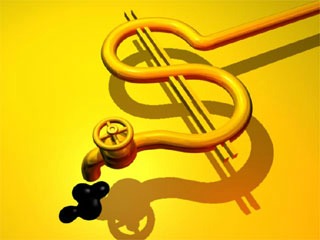Related Topics
Dislocations: Financial and Fundamental
The crash of 2007 was more than a bank panic. Thirty years of excessive borrowing had reached a point where something was certain to topple it. Alan Greenspan deplored "irrational exuberance" in 1996, but only in 2007 did everybody try to get out the door at the same time. The crash announced the switch to deleveraging, it did not cause it.
Whither, Federal Reserve? (2)After Our Crash
Whither, Federal Reserve? (2)
2008 -- A Time to Reflect

|
| Gas Prices |
The Northeast portion of America is cold; most of its public concern traces back to high prices for fuel oil. The Southwest, however, is warm and more concerned with house prices and mortgages. Air conditioning has been the main source of the South's revival. This geographic split in attention will have a powerful effect on politicians in an election year. We can only hope the ambivalence cancels out and restrains legislative action until it is at least clear what the extent of the damage is. Meanwhile, don't do something, just stand there. A central question is whether there are too many houses in California, or too few. For decades, Westward migration outpaced housing construction, so California house prices have long been too high, mortgage lending too "innovative". While it is natural for western builders to feel there are now too many houses for sale in California, a case can be made that present noises are merely squawks as house prices settle to more reasonable levels. With luck, the West may just ride it out. But after adjustment for current emigration, an excessive number of housing units per capita might just warrant paradoxical solutions for California. Empty houses usually breed slums, that's pretty simple. But please, could someone explain securitized mortgages?
Other sorts of people should be pondering where the long slow decline of banks is going to lead. It makes a difference whether regular banking and investment banking will merge -- or have a collision. Much will depend on how well the two industries manage their massive computer systems; the heavy reliance of commercial banks on software vendors (rather than doing their own programming) is not an encouraging sign. The person who can fix their problems lives in India. Something is going to have to change in the way the Federal Reserve manages the money supply if money is largely borrowed abroad. Commercial lending migrates toward non-bank sources and eventually deprives the Fed of useful tools. Commercial banks, investment banks, and the Federal Reserve all have different sorts of risk. But when a complex system is placed under stress, it is the weakest link in the chain at that moment which breaks.
Happy New Year, every one.
Originally published: Friday, December 28, 2007; most-recently modified: Thursday, May 09, 2019